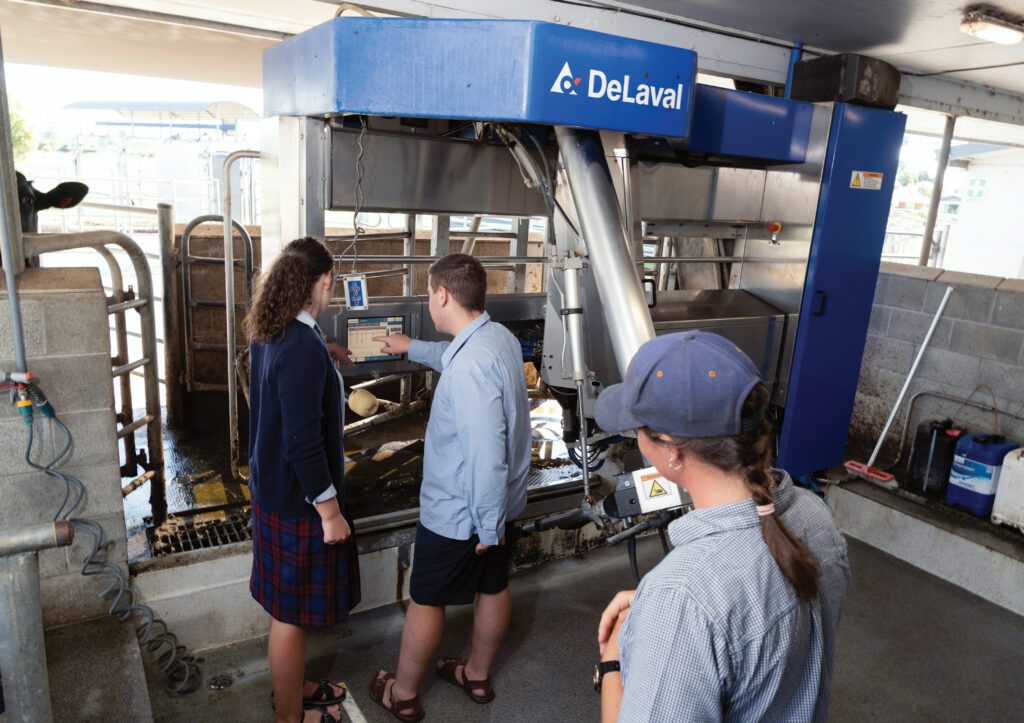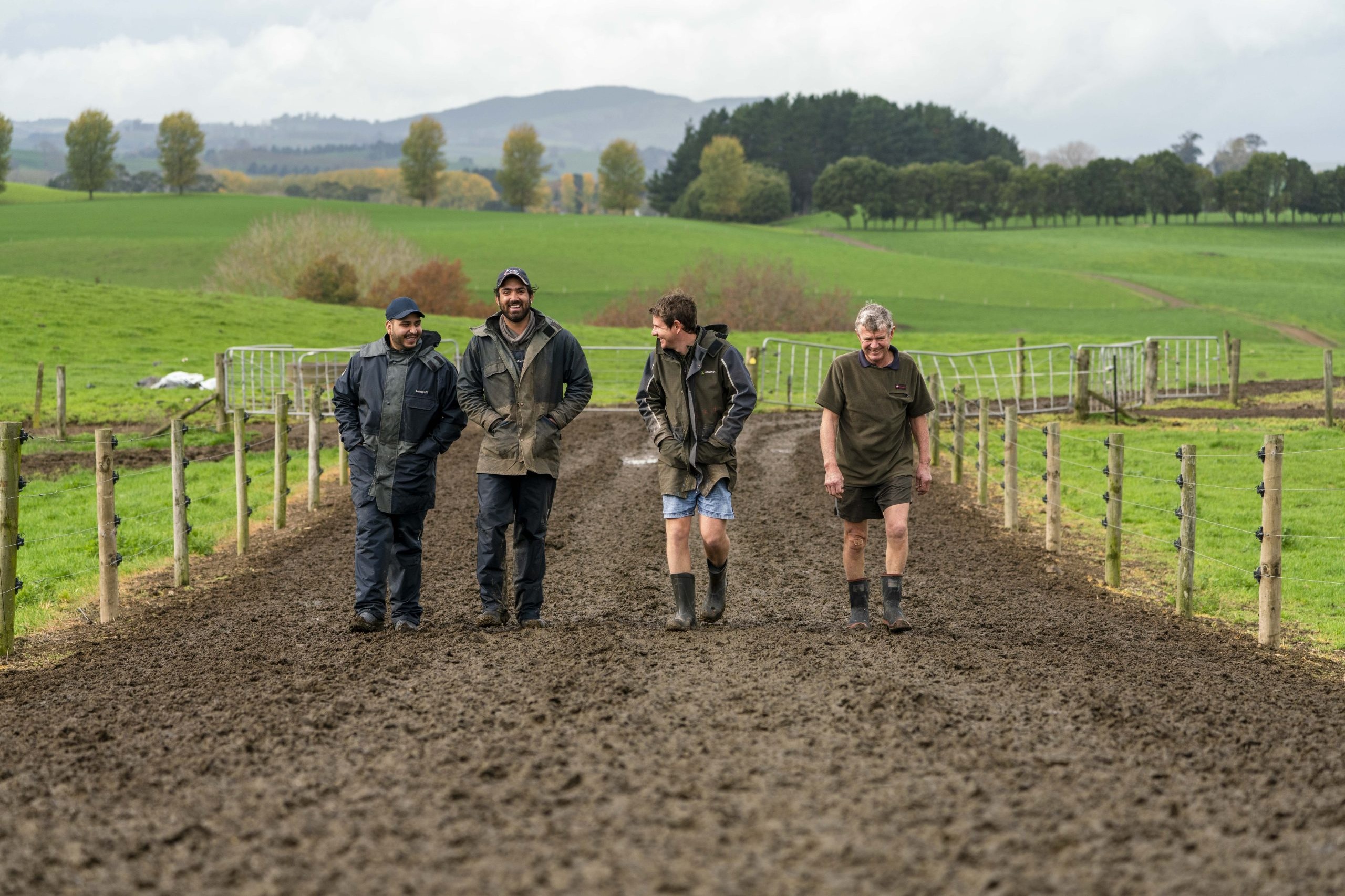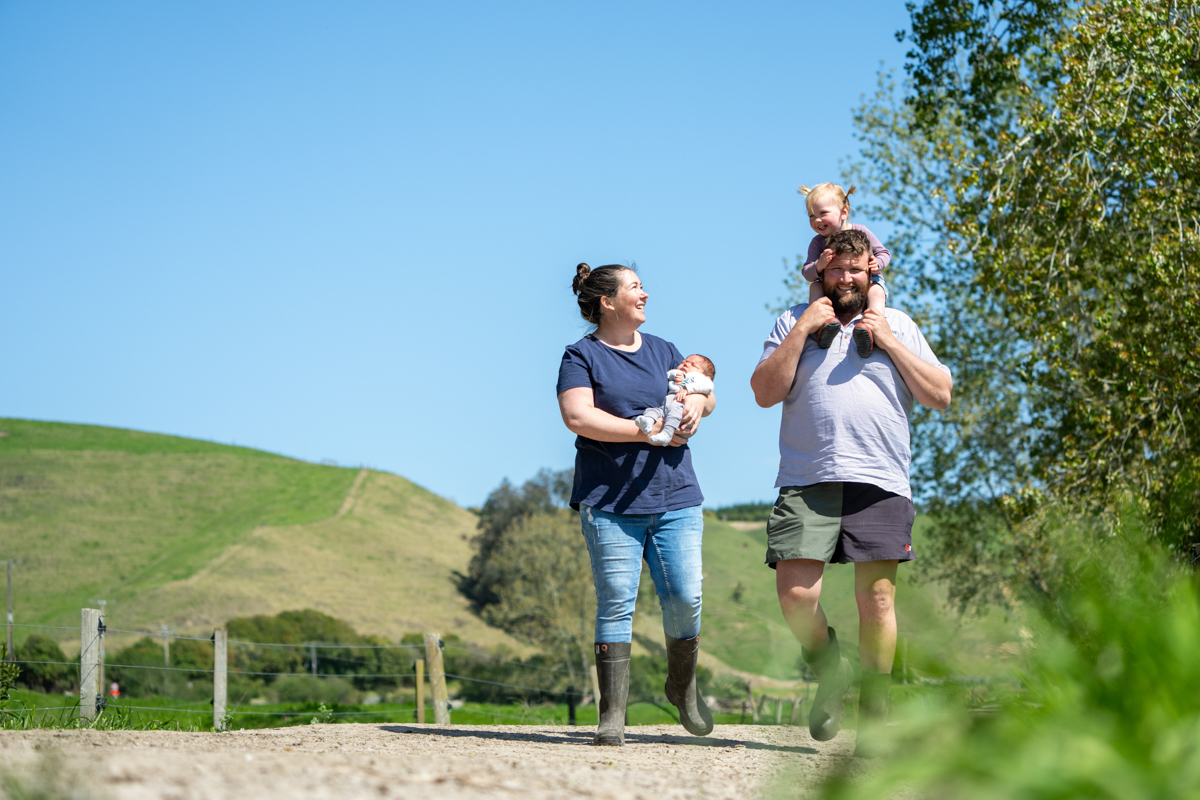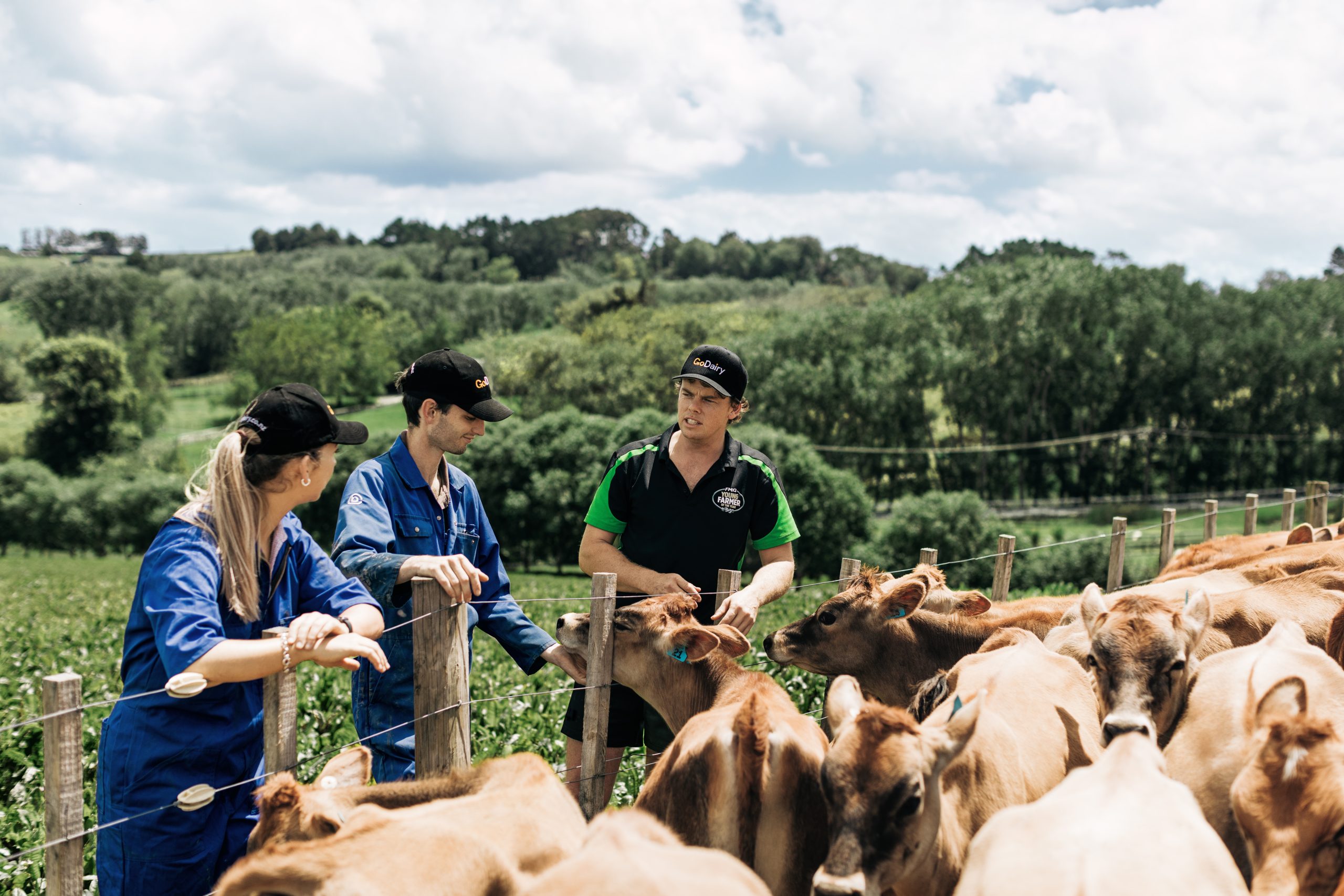A move to robotic milking has spearheaded the reinvigoration of the FAHS Feilding High school farms, growing the participation in the agriculture programme and getting back to profitability for the second 100 years of the agriculture and horticulture programme. Jackie Harrigan met the young manager putting her stamp on the programme. Photos by Brad Hanson.
When Mary Bartlett took on the role of Farm Manager at the Feilding High School farms almost three years ago, she gave principal Nathan Stewart a promise of five years in the job and thought that would give her time to figure out what aspect of the job she loved the best to inform where to take her career next.
“There are three really different aspects to the job – a small dairy herd milking through a robotic milker, a small breeding flock of ewes and larger trading lamb enterprise along with dairy beef finishing on the sheep farm and wrangling four students four days a week on ‘farm duty’ and facilitating the wider curriculum needs of over the half the school that are involved in the agri/hort faculty programmes.”
“I thought it would be easy to figure which aspect I loved best – the kids, – the dairy farm Ngakaunui, or Manawanui the sheep farm – or could I go into a wider industry role – but I haven’t been able to choose between them all yet because I enjoy them all!”
Coming from working through the previous three (dry) seasons on an extensive Western Australian beef station, a 26-hour drive from Perth, 3 million acres of red dirt and 25,000 Droughtmaster cows, was a huge change. But Mary is a Feilding High old girl, (although only 25 years old), she went through the farm duty system back in her day and comes from a local dairy farming family – so coming back to school was an easy transition and she is grateful for all the help and support she has received from the community and her family.
Mary laughs that she has lots of ‘farm dads’.

“My Dad helps me out on the dairy farm, along with Lindsay Rowe the farm adviser, Juan the vet and Dave Reay from DeLaval – who is the robot Dad, and Darrin Holm from Carrfields sources replacement cows…
“And then I have another set of Dads for the sheep business – Duncan Thomas from H&T is the agronomist for the lamb trading operation, Cam Waugh the Carrfield stock agent picks and organises the finished lambs and Mike Osborne helps me organise the breeding programme.
“They are all so helpful – I can ring them up and ask them anything – they are all happy to help and have put hours of time into volunteering their services.”
Six years ago the school farms were functioning but losing ground in the efficiency, best practice and profitability stakes and talk at one stage even came to selling them off and buying a bigger unit, school principal Nathan Stewart says.
“Thankfully there was no appetite for that, because the farms really help define who we are as a school. They are so handy to the classrooms (the dairy farm is literally across the rugby fields and over the back fence) allowing them to be used extensively by teachers all across the curriculum.
“Half the school students (of the now 1600-pupil student body) are involved in the ag and hort programme, including the 180 boarders who largely come from farming families – but we realised that some extensive upgrades needed to be made to expose our students to the latest best practice and technology revolution that agriculture was undergoing.”
The upgrade programme, that Leon Dale, the executive manager refers to as the ‘50-year infrastructure catchup’ was accompanied by an aggressive depreciation schedule that has seen the operation achieve a $24,000 cash surplus in the 2021 year – and Leon dreams of when the book profit happens after 10 years of depreciation.
“We have been so lucky to have had the support of community and sponsors – it’s been a whole-community effort.”
THE UPGRADE OF NGAKAUNUI
The first tranche was the purchase and installation of a De Laval VMS (Voluntary Milking System) robotic milker in 2018, with a move to year-round milking, and accompanied feeding of pellet supplement alongside homegrown supplement of grass balage and chicory cropping within a grass renewal programme.
The 16-hectare dairy farm was partially refenced with new lanes and subdivision allowing easy implementation of the A/B/C rotational grazing programme that sees the cows trafficking themselves through the robot or yard up to three times a day on their way to a new break.
Despite early worries that students would no longer learn the art of cupping a cow, Mary says no one has ever complained, as the ‘digital native’ students have embraced the technology of robotic milking and understanding the data collected.
The time freed up from twice-a-day milking also gives her time to teach the farm duty kids other skills, like shifting fences and effluent irrigation, learning the basics of pasture management and feeding out supplement – along with the thrill of learning to drive the new tractor or the satisfaction of being trained on safe use of quad bikes.
“I tell the kids that if they really want to learn the art of cupping I can find them heaps of local farmers to teach them to do it – but that that’s the boring bit – it’s much more fun feeding calves and doing other jobs,” she said.
Mary says she loves spending time with the students, teaching them things and exposing them to agriculture – even if jobs take a lot longer with a couple of kids in tow.
“I wouldn’t be able to do this job without the robot,” she says. “It just gives me so much more time to fit in jobs and to take the kids up to Manawanui and do jobs up there – as well as trips off-farm to field days, and the odd trip to Farmlands!”
Visits to Farmlands are usually worked in around lunchtime and necessitate driving past Feilding’s best pie shop (Mary still laughs at the parents who thanked her for introducing their farm duty offspring to the Beresford Bakery, saying that it’s now their family favourite!).
Hand in hand with the robot, retrofitted into the old herringbone dairy shed and yard reconfigure was building the Fonterra Seminar Room (with a grant from the Fonterra Grass Roots fund), a new effluent sump and pump, upgraded implement shed, new calf rearing shed and last year a 180-square-metre covered feed pad made from two pole sheds.
While it has been a big investment, the 50-year catchup has the farm now looking tidy and modern, with an emphasis on efficiency and productive cow flow.
“We can protect our clay soils while milking through a wet winter and follow latest animal welfare best practice – and importantly we are operating profitably,” the principal says.
Feeding pelletised feed as an enticement for the cows to come into the robot and improved pasture management has lifted per cow production from around 275kg milksolids (MS)/cow and 16,000kg MS to 480kg MS/cow and 24,000kg MS for the season.
The target is consistently 25,000kg MS, but on a small unit the production can be very weather dependent with a dry summer hammering pastures and pushing up the cost of balage.
The feed pad has worked well to minimise pugging and control cow intake while reducing wastage. Mary is talking to advisers about looking at using maize silage rather than balage.
One of the changes to the farm strategy was to buy in replacement cows and have a simple policy of using Hereford bulls over all cows and carrying the progeny on to finishing on Manawanui farm.
“It’s been a great policy change to move away from bobby calves, but the genetics of the replacement cows is really important for us to keep improving the efficiency of the cows. We are reliant on sourcing good cows when we need them, and also cows that are quiet enough to train easily to the robot,” Mary says.
“We budget for up to 15 new cows e ach season, but last season we only bought 10. We usually try to source second-calvers so they are quiet and used to a milking routine, although they still need to be trained for the robot. They also need to have great, uniform udders and good genetics… luckily we have a great stock agent and a really supportive community of farmers who are happy to sell us great cows.”
MANAWANUI MEATS
The 81ha sheep farm is rolling country on clay soils on the edge of Feilding in the past running a 300-ewe flock and the dairy youngstock. But a radical overhaul cutting the size of the ewe flock and introducing cropping forages has made room for a lamb finishing enterprise while also carrying and finishing dairy beef stock.
The Romney ewes are mated to black-faced Suffolk and white-faced Polled Dorset rams, lambing at 160% and providing great trial fodder for students to track the growth and finishing rates of black-faced vs white-faced lambs through the chicory, plantain and clover mix pastures using the EID weighing platform. A further 3000 lambs were traded in the last calendar year.
“The ag teachers love getting the students out on the farms to tie hands-on learning into their classroom learning. They are always coming up with trials we can run and activities the students can get involved in – and we try to accommodate them all,” Mary says.
“We have a pretty playful attitude to getting the students involved and are always looking for ways to make agriculture more of a centrepiece in the school.”
Principal Stewart says the 180 boarding students are very involved in the farm, many coming from rural backgrounds, and a number visit and help out on the farm after school.
The De Laval relationship includes training four students each year in the workings of the robotic milker and there is room for a senior student to do the training and go on to be a paid intern at the farm, providing holiday and weekend cover for the farm manager.
Ex-pupil Scott Harrigan was employed part-time for weekend work during his senior year and now works weekends and holidays and manages the dry cows while studying at Massey University for a B Agri Commerce degree.
“It’s a great stepping stone to a career in the sector,” Stewart says. “And the farms and our close industry relationships have the effect of opening the farm gate to the town kids at the school to consider those industry opportunities too.”
SIDE HUSTLES
Manawanui Meats: Branded Manawanui lamb cuts are about to be launched, selling at Feilding Farmers’ market or to staff and school families. Beef may follow.
Ngakaunui Honey: 250g pottles of honey sold out quickly, processed and marketed by Year 12 Gateway students who harvested 23kg of honey from the two school hives.
Beeswax candles: Made from wax from beehives
Kawakawa balm: Made by Enterprise students
Sheep manure: Bagged and sold from under the Manawanui woolshed at the Feilding Farmers markets by Enterprise students
Forestry programme: 12ha of production forestry pines are planted ranging from two to 25 years, silviculture covered in the curriculum and sponsored by JTL Forestry company.
Shearing schools: The Manawanui ewes and lambs are used for three annual shearing courses, two junior level and one advanced course for students interested in learning/developing their skills.
Maori medicinal plants: Looking into developing an area of planting alongside the farm.
Wetlands and farm beautification: With a boarding hostel full of willing workers, fences have been erected and trees planted around dams on the sheep farm and along races with support from Horizons Regional Council. One dam has been developed into a canoe polo court practice area for the school’s canoe polo teams.
School cross country events: School and inter school events are run around the farm.
Kellogg programme: Mary has been working her way through the Kellogg study programme – enjoying her wider exposure to the agri industry and drilling down on to the wool industry and appreciating building her confidence and knowledge of the sector.





